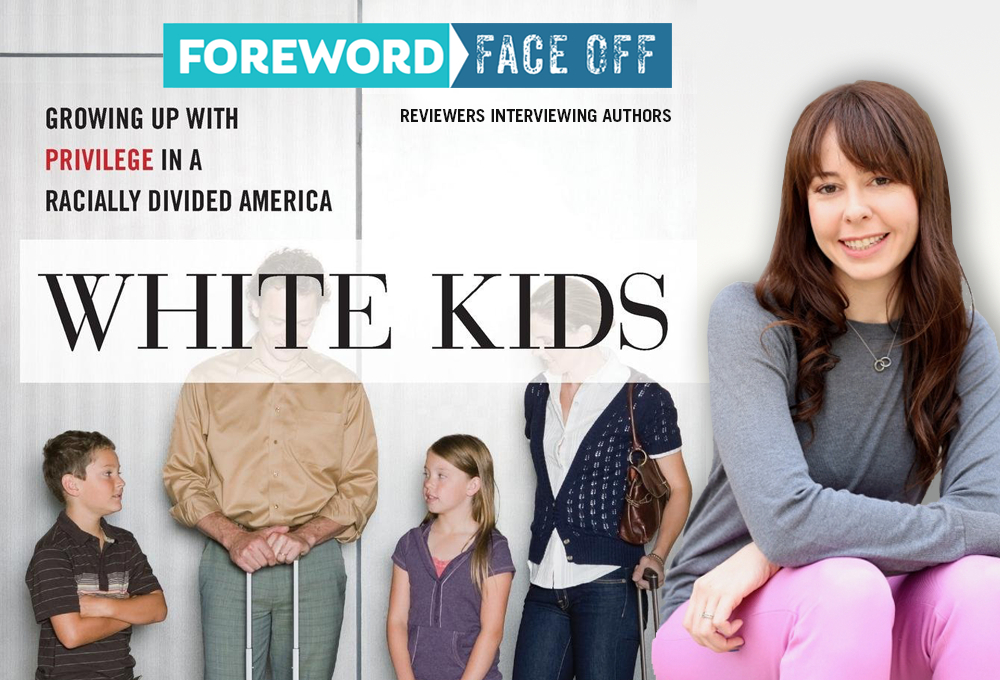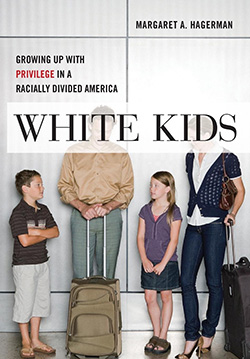White Kids

Reviewer Mya Alexice Talks Racism with Margaret Hagerman, Author of White Kids
One of the flimsiest of racial stereotypes is the idea that poor, uneducated folks harbor the most intense racist sentiments, and that the higher up the economic ladder you go, the more racially enlightened people get. It sounds reasonable, but research on the matter is far from certain. In fact, some prominent experts actually think blue collar families of modest means are the most racially progressive of all, perhaps because they encounter more people of color in the workplace and have become somewhat colorblind.
More studies are needed, but what’s painfully obvious—in this age of presidential tweets denigrating the intelligence of black athletes, black congresswomen, and black journalists—is that racism remains a serious problem throughout the different economic classes. Sadly, the US is far from the post-racial ideal so many of us are ready to give it credit for.

NYU Press recently sent us an advance reader’s copy of Margaret Hagerman’s White Kids: Growing Up with Privilege in a Racially Divided America, offering a remarkable look at the racial attitudes of affluent white American children. Recognizing a gem, we quickly forwarded the book to reviewer Mya Alexice to include in a Political and Social Science feature to appear in our upcoming September/October issue. In Mya’s review, she points out that “Hagerman studies the kids who benefit from systemic inequality,” thereby illuminating “the often hidden, coded world of prejudice that lingers in white America.”
Seeking more insight, we asked Mya to contact Margaret for this important, sobering Face Off interview.
Your book mainly takes place pre-Trump presidency. Do you think the widespread belief that America is post-racial society has changed after Trump and his explicitly racial rhetoric won an election?
When I conducted my research, President Obama was in office. Some of the parents I spoke with genuinely believed that racism was not that big of a problem anymore in the United States. They told me that if racism still existed, it was certainly not a problem in their Midwestern community but rather a problem associated with a few backwards individuals living in places like the South.
When President Trump won the election despite his explicitly racist rhetoric, I imagine some of the parents in my study were shocked, like many white liberals were across the country. I suspect that even the parents in my study who acknowledged to some extent the reality of racism in America were shocked. And I think this shock experienced by affluent, liberal, white people in general—and their eventual realization that a number of people in their very own affluent, highly-educated, white community voted for Trump despite his racist rhetoric—has led to some degree of recognition by white people that racism is indeed still a social problem.
Of course, this is something that members of racially marginalized groups have been expressing for centuries. It’s possible that one positive byproduct of President Trump’s explicitly racist rhetoric is that there are more deliberate conversations happening about racism in America rather than the “colorblind” ignorance expressed prior to this moment. However, I think there is still a lot of struggle to understand racism as a structural problem rather than solely one that operates in the minds of individual people.
Who are some of the writers and thinkers on race who have influenced you the most?
My teachers have influenced me the most, especially Amanda Lewis, Heather Beth Johnson, and Tyrone Forman. Some other writers whose thinking on race in general has influenced me include Eduardo Bonilla-Silva, Dorothy Roberts, Monica McDermott, Ronald Takaki, Kimberlé Crenshaw, Lawrence Bobo, and Ian Haney López. I have also been greatly influenced by scholarship and writing about racism and young people, particularly the work of Erin Winkler, Maisha Winn, Beverly Tatum, Cathy Cohen, Diane Hughes, Jonathan Kozol, and Michelle Fine. More recently, I have been influenced by writers like Ibram X. Kendi, Lisa Ko, Chimamanda Adichie, and Jesmyn Ward.
Are there any books or resources you would recommend to parents trying to raise antiracist children?
I think white parents trying to raise anti-racist white children need to start by honestly coming to terms with their own personal racial socialization and taking on the responsibility of (re)educating themselves about racism. I think reading books about the history of racism in America is a great place to start, like Ronald Takaki’s A Different Mirror: History of Multicultural America. Books that focus on the concept of race and racism like Dorothy Roberts’ Fatal Invention: How Science, Politics, and Big Business Re-Create Race in the Twenty-First Century and Eduardo Bonilla-Silva’s Racism Without Racists: Color-Blind Racism and the Persistence of Racial Inequality in America are both accessible and useful starting points. I think by reading books like these, white parents can start to think more critically about how race and racism shapes all of our lives, including the lives of their kids.
In terms of more explicit parenting resources, I think the organization that I am most consistently impressed with is a group called EmbraceRace. They share a lot of useful materials through their social media pages, and their actual website also contains lists of recommended children’s books, tip sheets for parents, podcasts, and so on. Other good resources include organizations like Teaching Tolerance, and Raising Race Conscious Children.
At times, subjects in White Kids engage in racist behavior and dialogue very openly. Was it difficult to listen to some of the blatantly racist statements made by subjects in the book without reacting in some way?
Yes. But it was important to me that I access the honest viewpoints of the people in my study. One of the problems with giving white people traditional attitudinal surveys about racial issues is that they either don’t respond to certain questions or they give the answer they think you want to hear to save face and avoid accusations of racism. As a result, it is difficult to know what they really think. The ethnographic research method that I used, however, allowed me to build relationships with people and come to see how they truthfully understood race, racism, racial inequality, and privilege. One technique I used to navigate this aspect of the project was to keep one set of field notes with descriptive observations and another set of notes with my own reactions and emotions to these observations—sort of like a journal. In addition, throughout the process, I tried to remind myself of my larger objective: uncovering and documenting what actually goes on within affluent, white families when it comes to how kids learn racism. I think to start working to fix a problem, you really have to understand it. My hope is that my research can offer some new insights into the role that affluent white families play in the reproduction of racial inequality.
Did this research change how much hope you have for future generations?
On the one hand, my findings do not leave me feeling particularly hopeful about the role that present and future generations of affluent white people will play in dismantling structural racism. The parents in my book, because they want to be “good parents,” utilize both their race and class privilege to provide their kids with the best math teacher, the best soccer coach, the best orthodontist, the best opportunities. And they do this even when they say that they want to live in an equal and just and antiracist society. I guess I don’t know how you interrupt the passing on of unfair advantages within families, particularly when that means challenging our collective ideas of what it means to be a good parent.
On the other hand, a couple of the children in this study really are doing meaningful work in their schools, community, and even in their families. I saw this become particularly evident when I went back and re-interviewed these kids in high school. These young people are not the majority of the kids I met, but they have been provided with both the language and the experiences not only to name racism but also to actively challenge it. And they are doing just that.
This book studied affluent white children. Why did you choose this population, and could you hazard a guess as to how the results might differ among less wealthy white children?
White children should not be disconnected from the study of race and racism. Although research on how inequality is experienced by members of marginalized groups is certainly very important, I think it is also important to examine how ideas and practices that sustain a racially unequal society are produced, learned, and enacted by people at the top of these hierarchies. I also think it is important to examine the power and influence that affluent, white children wield in our society—and how this contrasts with the experience of kids of color. We can learn new things about racial inequality and how it is reproduced across generations by examining critically the thought processes and behaviors of families with race and class privilege.
We definitely need more research on the topic of white racial socialization, including with families from different class backgrounds. If I had to hazard a guess, I think how racial socialization works is probably a pretty consistent process regardless of class, although parents likely have fewer available choices to make in terms of how to set up their kids’ lives compared to more affluent parents. In terms of what kids growing up in working class white families think about race, I’m not sure. Some scholars have found that working class whites hold the most racially progressive views while others have argued that working class whites feel a deeper anxiety about their class status and hold more racial resentment towards people of color. So, as far as what working class white kids think, I’d have to ask them.
Mya Alexice
